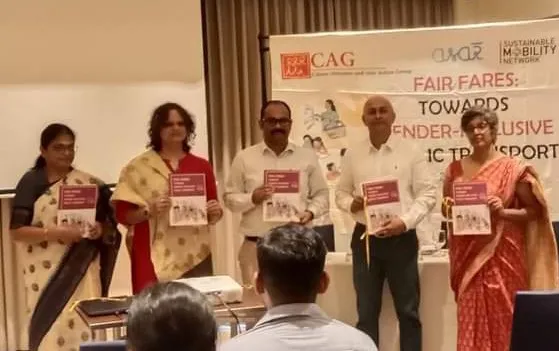Women in TN use savings from free bus service on healthcare, education of family: Study
According to the study, 20% of the women surveyed have been able to save Rs 600-800 a month, and considering that 90% of the women earned less than Rs 20,000 per month, the savings are not insignificant.
Around two-thirds of women have saved over Rs 400 a month through the Zero-Ticket Bus Travel Scheme, which was introduced in Tamil Nadu in 2021 to provide free bus travel to women, according to a research study.
The study titled Free Fares: Towards Gender Inclusive Transport, highlighted that 20% of the women surveyed have been able to save Rs 600-800 a month, and considering that 90% of the women earned less than Rs 20,000 per month, the savings are not insignificant.
The study was conducted by Citizen Consumer and Civic Action Group (CAG), a Chennai-based non-profit working towards protecting citizens' rights in consumer and environmental issues, by surveying 3,000 women across six cities—Chennai, Coimbatore, Salem, Tiruvarur, Tirunelveli, and Tiruvannamalai.
It also stated that the women mostly spent the money saved on non-perishable household necessities, food for the family, and education. Only 18 women said they spent on non-familial expenses such as leisure or personal care.

CAG report on Free Fares: Towards Gender Inclusive Transport
The study was released in the presence of Alby John Varghese, Managing Director of Metropolitan Transport Corporation (Chennai).
“The public narrative around this scheme has been about women being subsidised by men who pay for tickets and commute, and work outside the home. This argument does not take into account the unpaid work (domestic chores) that women do, and the fact that the money saved due to the scheme is invested in the family’s future,” the report noted.
The savings invested in better nutrition, for example, will contribute to reducing the family’s use of public healthcare services which then means the limited resources of Tamil Nadu government can be redirected elsewhere, it stated.
Close to 55 lakh passengers are said to be using the state bus services in Tamil Nadu every day. Of this, 35 lakh commuters are from Chennai alone.
“There is no gender-segregated data to show how many women use bus transport in the state,” says Sumana Narayanan, who leads the road safety work at CAG.
“In Tamil Nadu, public buses have different service categories—ordinary (whiteboard), express, deluxe, and A/C Volvo—and the fares for each of these vary. Women can travel free only in ordinary buses,” she said.
The CAG study comes a day after Tamil Nadu Finance Minister Thangam Thenarassu announced, during the state Budget for FY2024-25, that the free bus travel scheme would be extended to women residing in the hilly regions of Nilgiris, Kodaikanal, and Valparai at a cost of Rs 3,050 crore.
Edited by Kanishk Singh







